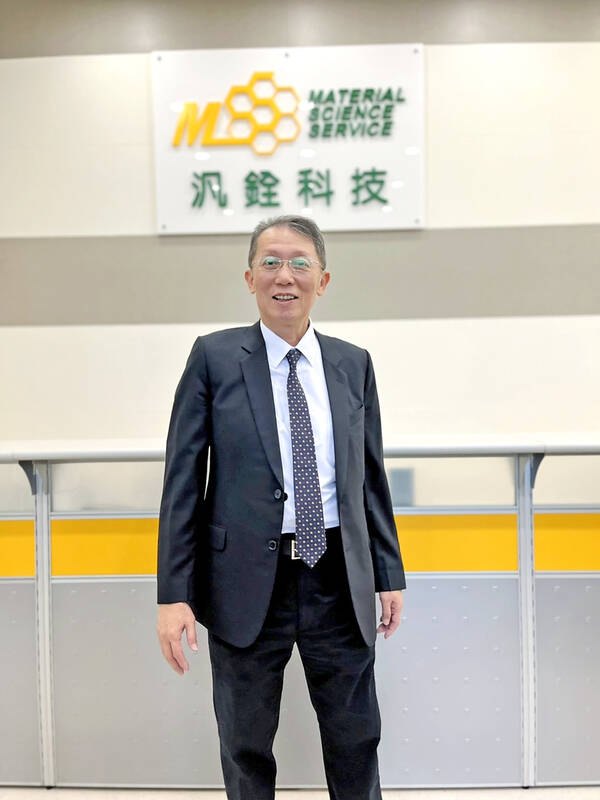Msscorps Co (汎銓科技), which specializes in materials analysis for Taiwan Semiconductor Manufacturing Co (台積電) and other semiconductor firms, yesterday said it plans to expand its capacity by 30 percent this year amid rising analysis demand for materials used in advanced technologies in Taiwan and Japan.
Strong demand for advanced semiconductor technologies helped back the company during an industry down cycle last year, Msscorps said.
To maintain its growth momentum, the company yesterday inaugurated a new plant at Tai Yuen Hi-Tech Industrial Park (台元科技園區) in Hsinchu County’s Jhubei City (竹北).

Photo: Grace Hung, Taipei Times
The new factory is to add 20 to 30 percent to its capacity in Taiwan, mostly for advanced technologies such as 2-nanometer equipment, the company said.
As new materials and new transistor architecture, dubbed gate-all-around, are adopted for the next generation of semiconductor technology, demand for materials analysis is on the rise, it said.
Msscorps two years ago ordered 30 pieces of equipment for NT$1.5 billion (US$48.37 million) and expects to receive about half of the machines this year, company chairman Gino Leou (柳紀綸) told a news conference.
The deliveries were delayed last year due to labor shortages and insufficient plant space, Leou said.
Msscorps aims to make Taiwan its biggest operational hub by capacity, contributing 75 percent of the company’s total capacity, following installation of the new equipment, he said.
As countries are racing to build local supply of advanced chips, Msscorps is stepping up its overseas deployment this year, he said.
The company plans to begin operations at a new factory near Tokyo in the third quarter of this year after three years of evaluations, Leou said, adding that the Japanese plant is expected to contribute 5 to 6 percent of the firm’s total capacity in its first year.
In China, Msscorps is also expanding capacity at an annual pace of about 50 percent as Chinese semiconductor firms proceed with aggressive technology advancement to overcome chip restrictions imposed by the US, he said.
Msscorps hopes to translate most of the capacity expansion into a new revenue stream this year, hopefully boosting revenue growth to outpace last year’s momentum, he said.
Apart from robust demand for advanced technologies, a recovery in semiconductor demand is also expected to fuel growth in the second half of this year, he said.
In the first 11 months of last year, revenue expanded 10.88 percent year-on-year to NT$1.72 billion.
About 85 percent of the company’s revenue came from materials analysis services, while failure analysis services accounted for 15 percent, the company said.

Semiconductor shares in China surged yesterday after Reuters reported the US had ordered chipmaking giant Taiwan Semiconductor Manufacturing Co (TSMC, 台積電) to halt shipments of advanced chips to Chinese customers, which investors believe could accelerate Beijing’s self-reliance efforts. TSMC yesterday started to suspend shipments of certain sophisticated chips to some Chinese clients after receiving a letter from the US Department of Commerce imposing export restrictions on those products, Reuters reported on Sunday, citing an unnamed source. The US imposed export restrictions on TSMC’s 7-nanometer or more advanced designs, Reuters reported. Investors figured that would encourage authorities to support China’s industry and bought shares

TECH WAR CONTINUES: The suspension of TSMC AI chips and GPUs would be a heavy blow to China’s chip designers and would affect its competitive edge Taiwan Semiconductor Manufacturing Co (TSMC, 台積電), the world’s biggest contract chipmaker, is reportedly to halt supply of artificial intelligence (AI) chips and graphics processing units (GPUs) made on 7-nanometer or more advanced process technologies from next week in order to comply with US Department of Commerce rules. TSMC has sent e-mails to its Chinese AI customers, informing them about the suspension starting on Monday, Chinese online news outlet Ijiwei.com (愛集微) reported yesterday. The US Department of Commerce has not formally unveiled further semiconductor measures against China yet. “TSMC does not comment on market rumors. TSMC is a law-abiding company and we are

FLEXIBLE: Taiwan can develop its own ground station equipment, and has highly competitive manufacturers and suppliers with diversified production, the MOEA said The Ministry of Economic Affairs (MOEA) yesterday disputed reports that suppliers to US-based Space Exploration Technologies Corp (SpaceX) had been asked to move production out of Taiwan. Reuters had reported on Tuesday last week that Elon Musk-owned SpaceX had asked their manufacturers to produce outside of Taiwan given geopolitical risks and that at least one Taiwanese supplier had been pushed to relocate production to Vietnam. SpaceX’s requests place a renewed focus on the contentious relationship Musk has had with Taiwan, especially after he said last year that Taiwan is an “integral part” of China, sparking sharp criticism from Taiwanese authorities. The ministry said

US President Joe Biden’s administration is racing to complete CHIPS and Science Act agreements with companies such as Intel Corp and Samsung Electronics Co, aiming to shore up one of its signature initiatives before US president-elect Donald Trump enters the White House. The US Department of Commerce has allocated more than 90 percent of the US$39 billion in grants under the act, a landmark law enacted in 2022 designed to rebuild the domestic chip industry. However, the agency has only announced one binding agreement so far. The next two months would prove critical for more than 20 companies still in the process